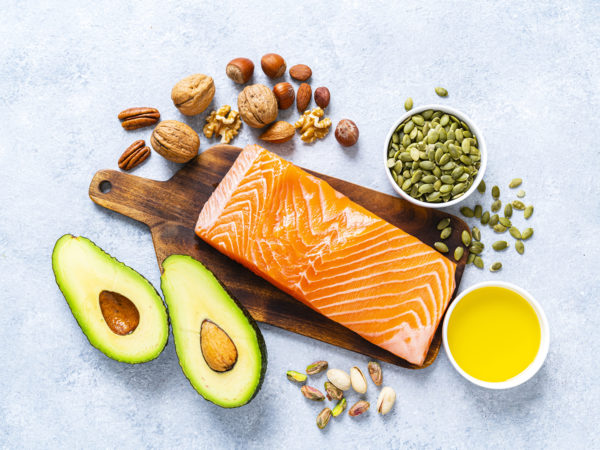Can Certain Foods Lower Cortisol Levels?
Much has been said about stress increasing cortisol levels and being somewhat responsible for belly fat. I am aware that exercise, yoga and meditation can help reduce stress, but I’m wondering if there are any foods or supplements that can lower cortisol levels?
Andrew Weil, M.D. | March 31, 2017

Cortisol is a hormone secreted by the adrenal glands in response to stress. Research suggests an association between cortisol levels and the accumulation of excess weight in the abdominal area, particularly in women.
Some studies have found that certain foods may help prevent this. Research published last year (2015) showed that sugar can reduce cortisol levels. Investigators at the U.S. Department of Agriculture’s Stress Biology and Nutrition Research Laboratory, in Davis, California compared the effects of sweets on adrenal function. They provided drinks sweetened with sugar or aspartame to 19 women volunteers who then took arithmetic tests known to be stressful. Afterward, when the researchers measured the women’s cortisol, they found that levels were lower in those whose drinks were sweetened with sugar. Study author Kevin D. Laugero, a nutritionist, noted in a press release that accompanied publication of the study that this evidence is the first to show that sugar consumption can influence stress in humans. However, he was quoted in news reports as saying that no one should use sugar as a stress reducer because of its known detrimental effects on health.
Other evidence suggests that the omega 3 fatty acids found in salmon, sardines, mackerel and other oily cold-water fish can reduce cortisol levels and stress. In a Gettysburg College study, men and women who took 4,000 mg (4 grams) of fish oil a day for six weeks lowered their morning cortisol levels and also lost body fat.
In addition, a study from University College, London published in 2010 found that drinking black tea lowered cortisol levels in the young men who participated. Volunteers who drank black tea 4 times a day for 6 weeks had lower blood levels of cortisol after a stressful event compared with men in a control group who drank a placebo that looked and tasted like tea. Another study from Switzerland found that consuming 40 grams (about 1.4 ounces) of dark chocolate daily for two weeks reduced cortisol levels – but only in people whose anxiety was high when the study began.
Finally, daily vitamin C supplements can help lower cortisol levels, at least in runners who have completed an ultramarathon.
Apart from sugar, the foods and supplements shown to help lower cortisol levels parallel my recommendations for a healthy lifestyle. If you want to decrease the impact of stress in your life, be sure also to get regular exercise and sufficient sleep, and try to incorporate meditation or relaxation techniques into your daily routine. My 4-7-8 breathing exercise will promote both mental and physical calmness. Practice it at least twice a day, and try it whenever you feel anxious or upset.
Andrew Weil, M.D.
Sources:
E.E. Noreen and J. Brandauer, “The effects of supplemental fish oil on blood pressure and morning cortisol in normotensive adults: a pilot study.” Journal of Complementary and Integrative Medicine, October 23, 2012, doi: 10.1515/1553-3840.1467.
Kevin D. Lugero et al, “Excessive Sugar Consumption May Be a Difficult Habit to Break: A View From the Brain and Body.” The Journal of Clinical Endocrinology & Metabolism, April 16, 2015 DOI: http://dx.doi.org/10.1210/jc.2014-43535
- M. Peters, et al. “Vitamin C supplementation attenuates the increases in circulating cortisol, adrenaline and anti-inflammatory polypeptides following ultramarathon running.” International Journal of Sports Medicine, October 2001.












